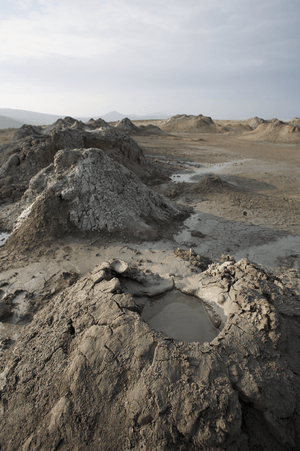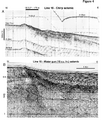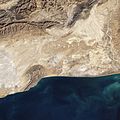Mud volcano facts for kids

A mud volcano is a special kind of volcano. Instead of hot lava, it spits out mud, water, and gases from deep inside the Earth. These volcanoes are much cooler than regular ones. In fact, the mud can sometimes be as cold as ice!
Mud volcanoes can be quite large. The biggest ones can be up to 10 kilometers (about 6 miles) wide. They can also grow as tall as 700 meters (about 2,300 feet). That's taller than many skyscrapers! The main gas that comes out of them is methane, which is also known as natural gas. They can also release carbon dioxide.
Contents
What Are Mud Volcanoes Like?
Mud volcanoes form when mud and gases push their way up from underground. This can happen on land or even on the ocean floor. The mud they release often contains salty water or even some acids.
These volcanoes are often found in places where there are oil and gas deposits. They are also common near areas where Earth's huge tectonic plates are crashing into each other. Sometimes, you'll find them close to regular lava volcanoes too. But remember, mud volcanoes only release mud and gases, not fiery hot magma!
Scientists have found about 1,100 mud volcanoes on land and in shallow waters. But they believe there could be more than 10,000 of them hidden deep on the ocean floor!
Parts of a Mud Volcano
Mud volcanoes have different features:
- A gryphon is a short, steep cone that lets out mud.
- A mud cone is a taller cone that releases mud and small rocks.
- A scoria cone forms when mud deposits get heated up.
- Salses are pools of water where gases bubble out.
Most of the mud and gas comes out during big "eruptions." But sometimes, mud volcanoes can also release things when they are "sleeping" or dormant.
Where to Find Mud Volcanoes
Mud volcanoes are found all over the world, but some places have more than others.
Europe and Asia
You can find some mud volcanoes in Europe, especially in parts of Russia and Ukraine. In Italy, there are many near the Apennines mountains and in Sicily. Romania also has the Berca Mud Volcanoes. Many mud volcanoes are located near the Black Sea and Caspian Sea. This is because the movement of Earth's plates in these areas creates a lot of gas and mud.
Some of the tallest mud volcanoes are in Azerbaijan. You can also find them in Iran and Pakistan, especially in the Makran mountain range.
China has many mud volcanoes in its Xinjiang province. There are two active ones in southern Taiwan. The island of Baratang in India's Andaman Islands also has a few active mud volcanoes.
Azerbaijan: A Mud Volcano Hotspot
It's amazing to think that out of about 700 mud volcanoes on Earth, around 300 of them are found in eastern Azerbaijan and in the Caspian Sea! This makes Azerbaijan a very special place for studying these unique geological features.
Related pages
Images for kids
-
Hydrate-bearing sediments, which often are associated with mud volcano activity. Source: USGS, 1996.
-
Mud volcano in the Gulf of Mexico sea bottom
-
Mud volcanoes in Gobustan, Azerbaijan
-
A cold mud pot in Glenblair, California
-
Aerial view of mud volcanoes on the Nahlin Plateau, British Columbia. Scale – each volcano approximately 20 m in diameter.
-
Mud volcano in southern Trinidad c. 1967
See also
 In Spanish: Volcán de lodo para niños
In Spanish: Volcán de lodo para niños
 | Victor J. Glover |
 | Yvonne Cagle |
 | Jeanette Epps |
 | Bernard A. Harris Jr. |




















